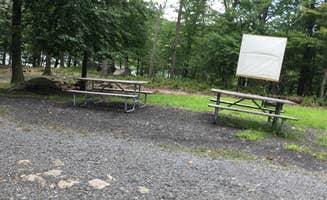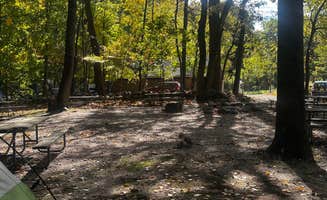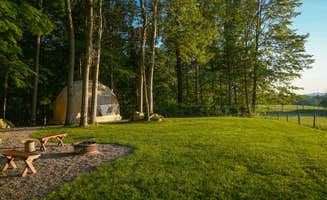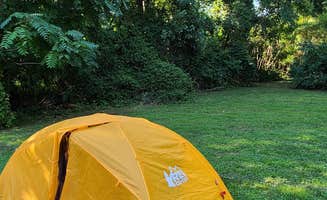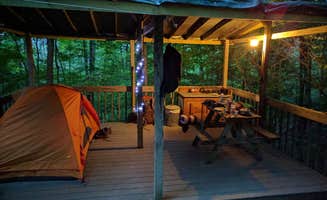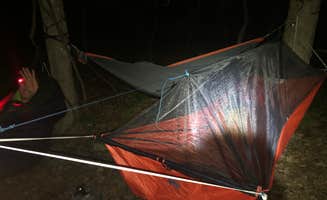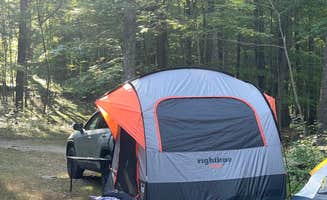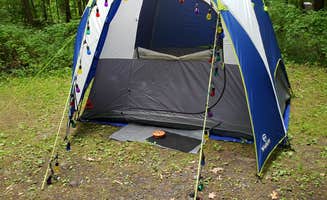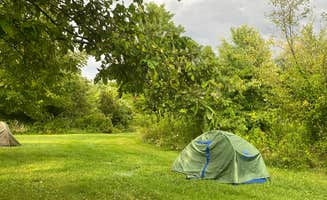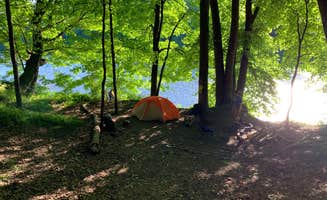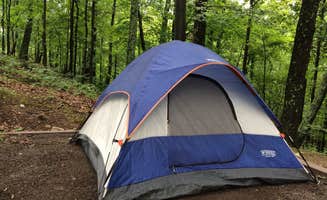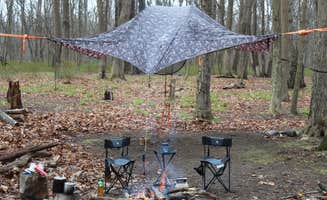Tent camping near Southfields, New York ranges from remote backcountry sites to more developed camping areas across several state parks within a 30-minute drive. The region sits at elevations between 400-1,300 feet, creating varied terrain with rocky outcroppings, streams, and small lakes scattered throughout the Hudson Highlands. Summer temperatures typically range from 60-85°F with higher humidity, while fall brings cooler 45-65°F temperatures and drier conditions.
What to do
Hiking to primitive campsites: The Suffern-Bear Mountain Trail offers challenging terrain with significant rewards for those willing to make the trek. "At one point of the trail is a very difficult, but doable, rock scramble up the side of the mountain. At the top of the scramble is a primitive camping site with amazing views," notes camper Ethan K. The site is approximately 2.5 miles from the trailhead, making it important to pack light.
Swimming and beach access: Multiple camping areas provide lake access for cooling off during summer months. The Sebago Cabin Camp features "a huge lake and great beach area. It was perfect for lounging and swimming in during a hot summer day," according to reviewer Ethan K. For those staying at other campgrounds, reviewer Katharine T. suggests: "Ignore the hotplate and just cook on a fire out other outdoor set up. Don't expect to swim on site- go to Lake Welch near by!"
Movie nights and community events: Several campgrounds organize regular activities during peak season. At Sebago Cabin Camp, ranger-led programs create social opportunities. Ranger Joe coordinates "movie nights they do big bon 🔥 on Saturday very kid friendly," shares Hashim C. Sara P. adds that they "also do Karaoke nights too" on weekends, making it a good option for campers seeking more structured recreation beyond hiking and swimming.
What campers like
Proximity to NYC: The tent camping areas around Southfields provide accessible wilderness experiences for urban dwellers. At Croton Point Park, Anil S. notes it's "a gorgeous camping ground right on the Hudson with beach and trails" where you can find "tent sites are very private with some dirt roads to exit out but thats what make it unique experience!" Esther L. summarizes the appeal simply: "Close enough to the city, far enough to enjoy the nature."
Cell service gaps: Many campers appreciate the disconnected experience at certain sites. Sara P. mentioned about Sebago Cabins: "Absolutely zero phone service (for T-Mobile) which was AMAZING." This digital detox opportunity allows campers to fully immerse in the outdoor experience without constant connectivity distractions.
Diverse accommodation options: Tent campers have choices ranging from completely primitive sites to more developed platforms. At Moon Valley Campground, Bob F. notes it's a "great campsite nestled in the foothills of Northern NJ on the NY border. Small, clean with great views and great location for hiking, cruising etc. Bring your tent or use the existing glamping tents."
What you should know
Bear activity requirements: Bears are common throughout camping areas near Southfields. Anil S. warns Croton Point Park visitors to "Keep your food in the dry bag and away from the tent or benches provided or face the packs of fearless racoons at night." Most established campgrounds provide bear boxes, but backcountry campers should bring bear-resistant containers.
Water availability varies: Many primitive sites require carrying in all water. The Stonetown Circular Trail offers natural water sources, with Ethan K. noting site #2 is "right next to a flowing stream with fresh water," but treatment is still required. Established campgrounds typically provide potable water, though some shut off water sources during shoulder seasons.
Reservation systems differ: Each camping area has its own booking process. At Croton Point Park, Jonathan C. notes it costs "$50/night without Westchester pass" and advises tent campers to "try to stay away from this end of the site or choose a site away from other bookings if you'd like quiet." Most established campgrounds require advance reservations, while backcountry sites typically operate on first-come, first-served basis.
Tips for camping with families
Look for ranger programs: Family-friendly activities make certain campgrounds more suitable for children. At Sebago Cabin Camp, Hashim C. describes how "ranger Joe is 👌 with the kids" and coordinates activities that keep younger campers engaged throughout their stay.
Consider noise levels: When tent camping with children in Southfields, selecting quieter areas improves the experience. Jonathan C. warns about Croton Point Park: "The site was very loud (dance music) until after 11pm. Quiet time at 10pm. Great site for a party, try to stay away from this end of the site or choose a site away from other bookings if you'd like quiet."
Check bathroom accessibility: The Stephen & Betsy Corman AMC Harriman Outdoor Center provides "very nice and clean" bathrooms according to reviews, while at many backcountry sites, you'll need to manage without facilities. Johanan O. notes that at primitive camping behind Tom Jones Shelter, "Great campground, always a bunch of people there. Firewood can be scarce."
Tips from RVers
Limited RV options: Most tent camping areas near Southfields have few or no RV-specific amenities. Croton Point Park offers some RV sites, but Andrew A. warns "there is a train depot right outside and you can hear them shunting trains all night," making it potentially disruptive for light sleepers.
Pack-in requirements: Many campgrounds require significant walking to reach tent sites. At The Stephen & Betsy Corman AMC Harriman Outdoor Center, Meredith C. notes "Free camping at stone shelters" is available, but these require hiking in with all supplies. For those seeking more amenities, she adds "The AMC camp in Harriman is fantastic too! Those are reserved and paid cabins and platforms."


